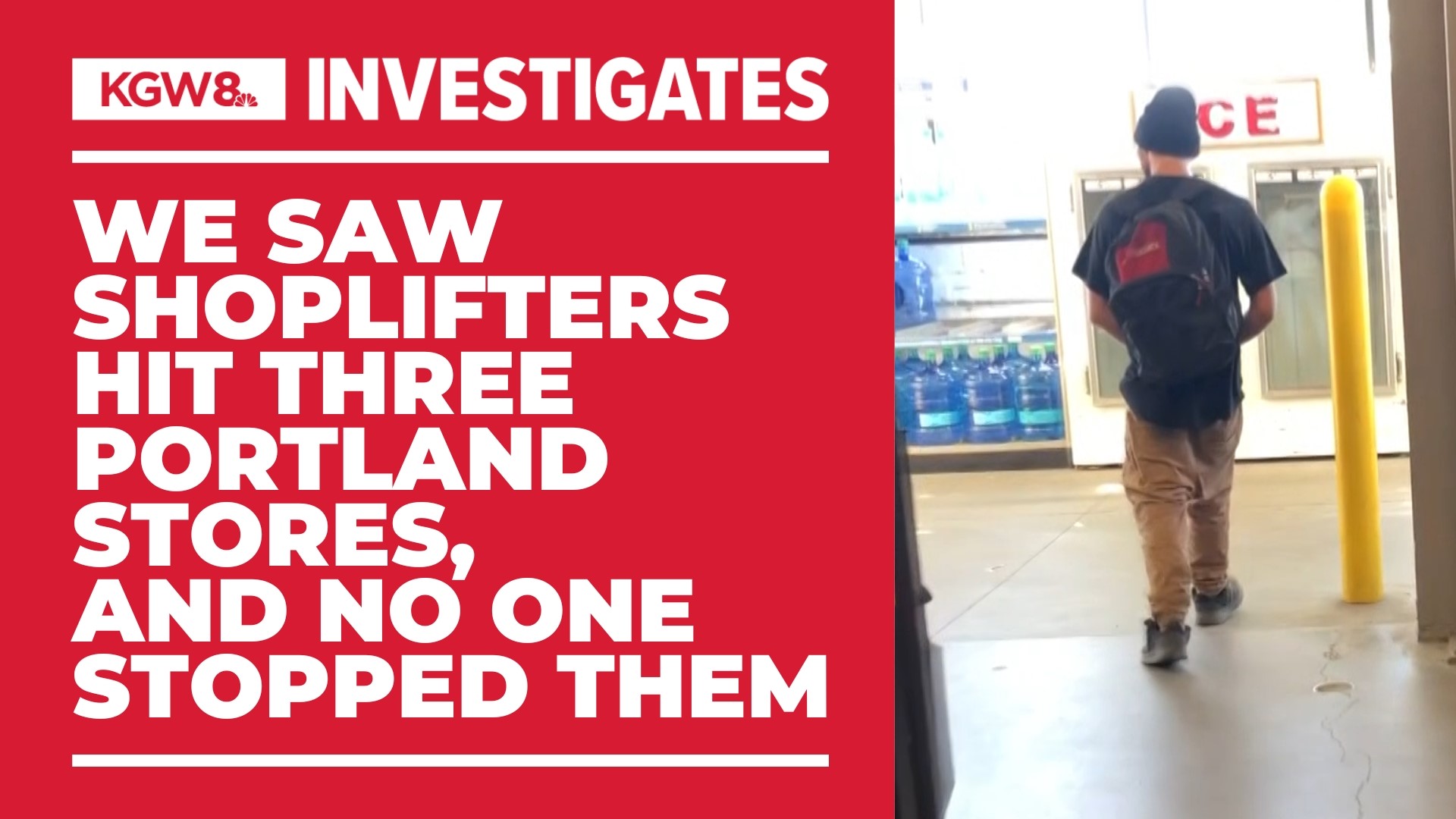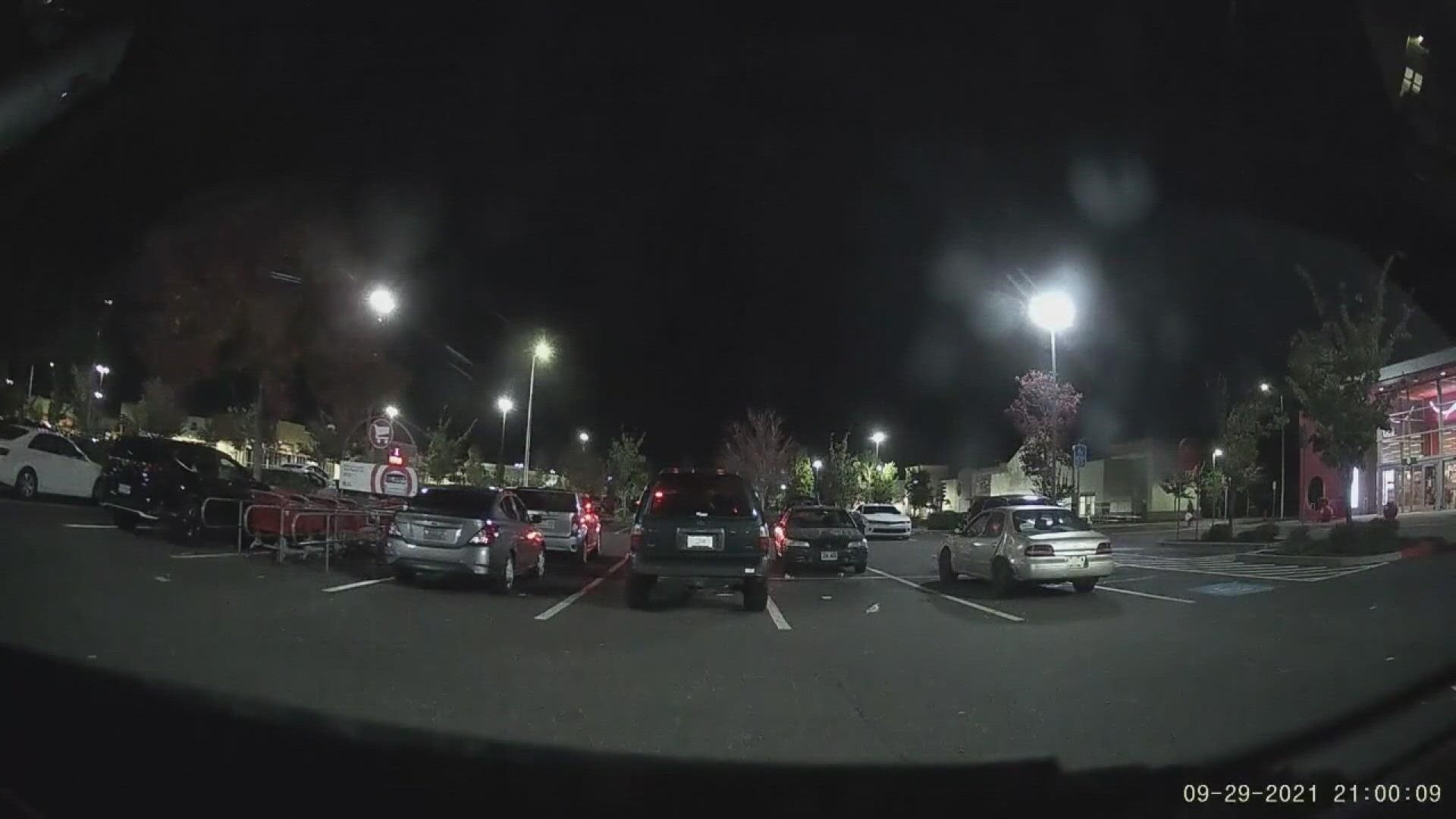PORTLAND, Ore. — It’s 3:55 on a Thursday afternoon in the Mall 205 parking lot. I’m watching through the front windshield of our white Ford Explorer as unsuspecting shoppers zip in and out of the Target store and nearby Home Depot.
The shopping mall, located near Interstate 205 in Southeast Portland, attracts a mix of construction workers, everyday shoppers and homeless people from nearby encampments.
I’m on the lookout. I want to find out how easy it is for shoplifters to steal in Portland and then see what happens to all that stolen merchandise.
Police, prosecutors, retailers, private security and neighbors complain shoplifting or organized retail crime is a citywide epidemic — largely fueled by drug addiction. Criminals are literally stealing merchandise off store shelves and walking out the front door with little or no fear of being arrested or prosecuted.

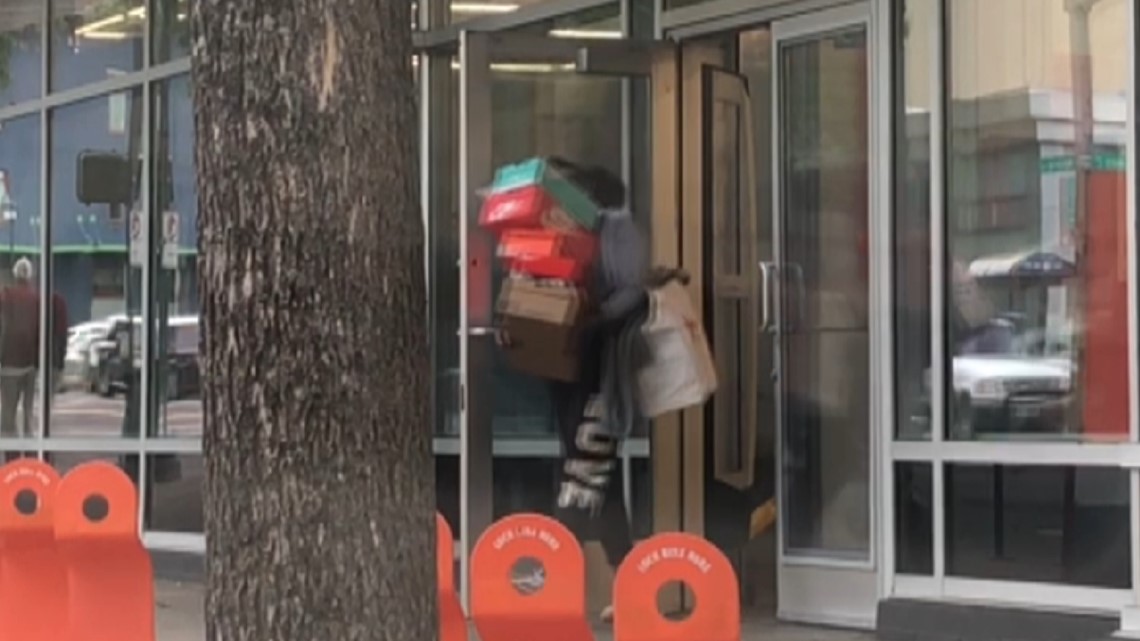
“It is at a crisis level,” explained Jeremy Girard of the Oregon Retail Crime Association. Girard estimates some of the hardest hit stores in the Portland-area are losing between $1 million to $5 million annually to theft. Retailers across the city have been forced to hire private security guards, lock down valuable items, change store layout, reduce hours or simply close their doors.
The Nike Community Store in Northeast Portland was closed intermittently throughout September and October reportedly because of widespread theft. Nike wouldn’t share details.
“Stores are not going to be able to sustain for the long haul if organized retail crime continues to get worse,” warned Girard.
Wide range of stolen products
I’d been watching for less than an hour when I began to see suspicious activity. Once you know what to look for, it becomes obvious that some people are stealing. And we’re not talking about people ripping off food because they're hungry. Instead, thieves are stealing items that can easily be resold in exchange for drugs or drug money. Police say fentanyl and heroin are the drugs of choice for most local shoplifters. The more sophisticated out-of-town crime rings are typically driven by money.
One guy ran from the Home Depot store with two large jugs of Tide detergent. He weaved through the shopping mall parking lot before racing off towards a MAX light rail station, despite the fact no one was chasing him. I eventually lost sight of him.
Detergent, diapers, baby formula and razors are among the top items stolen from big box retailers because these household staples can be easily resold at a discounted rate.
At the Mall 205 Target store, theft of detergent is so bad that anti-theft tags are attached to each bottle. Additionally, shelves of baby formula are only partially stocked, and some electronics are no longer displayed.

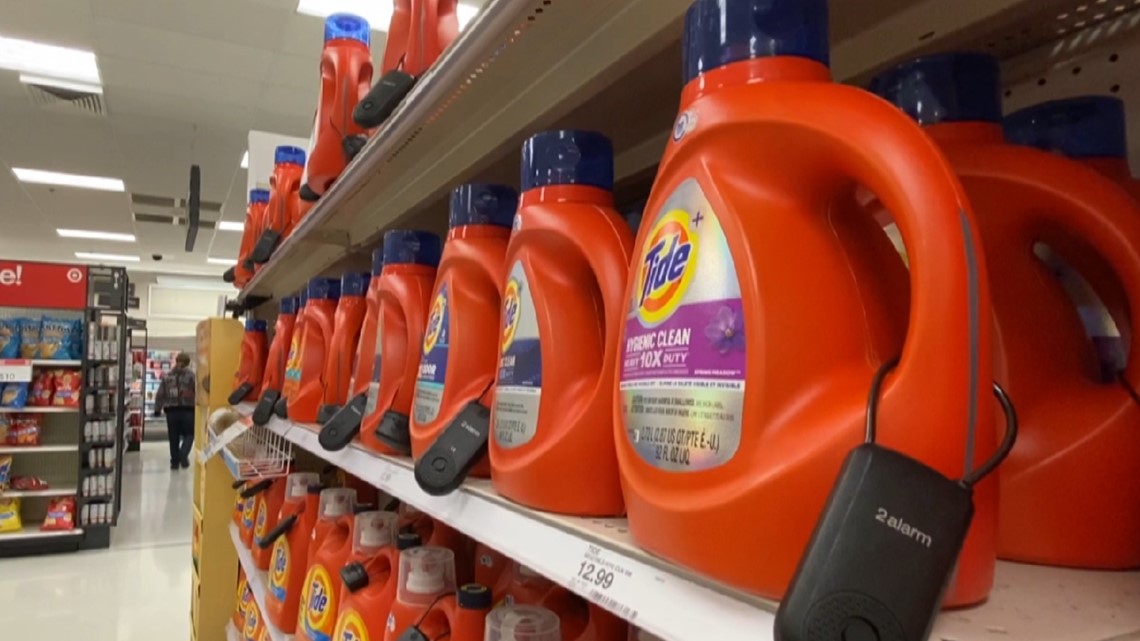
Retail security experts say thieves are also ripping off fragrances, purses, Levi’s, Nikes, electronics and power tools.
“Basically, anything that has resale value is being targeted,” explained Girard.
Employees frustrated
Cell phone video from September 2021 illustrates the brazenness of some thieves. The video shows four people unloading two shopping carts full of stolen clothing into a minivan at the Target in Jantzen Beach Center.
The man who shot the video and posted it on social media asked that we only use his first name. Sean said he worked security for seven years at Portland-area stores, including Fred Meyer, Safeway and Home Depot. He left retail loss prevention in 2014 after becoming frustrated with company policies that prohibited employees from physically stopping criminals.
“It got to the point where you could count on one hand the number of retailers that allow their employees to go hands on,” said Sean.
Employees typically lose their jobs if they physically try to stop or confront a shoplifter. Hands-off policies, adopted by most major retailers, are meant to protect employees and shoppers from harm. There’s also a risk of civil lawsuit if someone gets hurt.
Sean argues these hands-off policies seem to invite crime.
“They have basically been given the sign ‘hey, you are good to go in and steal and nothing is going to happen to you,’” said Sean.
Sitting in the Mall 205 parking lot, I noticed a trend among certain people — backpacks. Unlike most shoppers hustling into Target for a bathroom mat or breezing through Home Depot to buy a ceiling fan, an unusual number of people were wearing big backpacks. Not to disparage the backpack-wearing crowd, but this seemed very, very suspicious.
I watched one man wearing an oversized backpack walk diagonally through the Mall 205 parking lot. He didn’t seem to have any real direction, until he spotted an old pickup truck. After a short discussion with the driver, the man wearing the backpack walked into the Home Depot. I decided to follow.
The man walked up and down a few aisles before stopping in front of a display of the most expensive circular saw blades. I watched awkwardly, trying to avoid detection while the man grabbed a couple saw blades and walked off. He disappeared momentarily, by zigging and zagging through several aisles of Home Depot before walking past a cashier and other shoppers wearing his large backpack. Nobody stopped him.

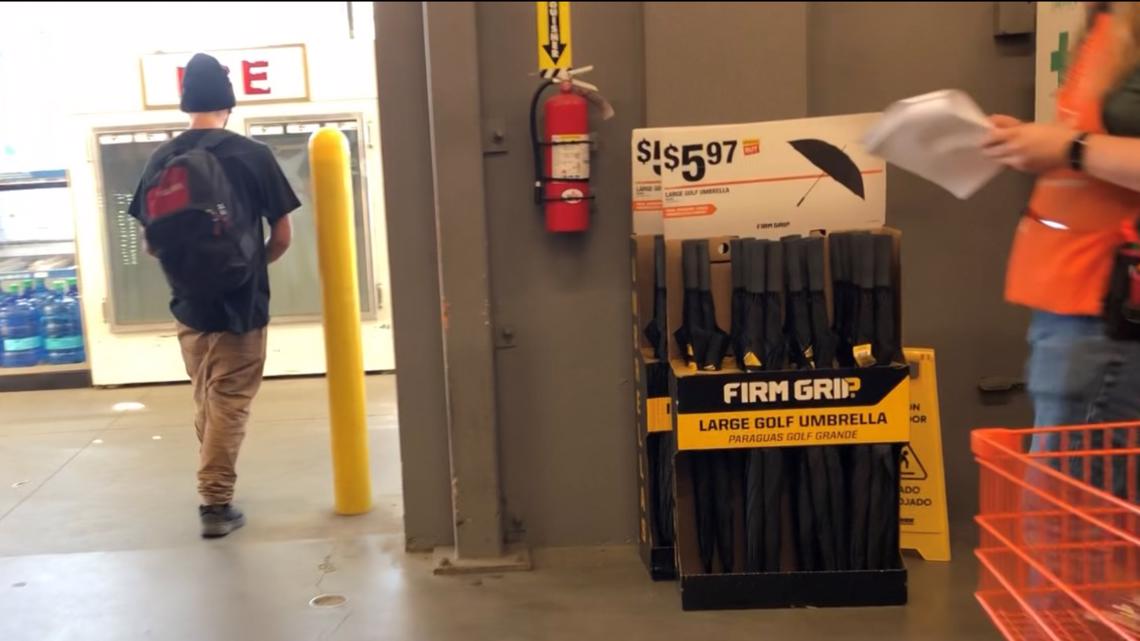
I followed from a distance and watched as the man got into the truck and appeared to reveal his loot to the driver— stolen circular saw blades valued at roughly $35 each.
The impact of shoplifting
In 2021, Portland Police received 3,174 reports of shoplifting, according to an online police dashboard.
KGW’s analysis of citywide crime data found since 2019, the highest number of shoplifting reports came from the Mall 205 Target Store, the Nike Community Store in Northeast Portland, the Target at Jantzen Beach Center and Nordstrom Rack in downtown Portland.
Retailers say Portland’s shoplifting statistics are a gross undercount.
A survey conducted earlier this year by the Organized Retail Crime Association of Oregon found most major retailers in Portland often don’t bother filing police reports, citing a lack of police response, lack of prosecution, incidents that are lower level or company policy.
“We see some of the same individuals who are hitting multiple retailers every single day,” warned Girard of the Organized Retail Crime Association.
OTHER STORIES: Suspected shoplifter nearly hits pedestrians while attempting getaway in stolen car, crashes into vacant storefront
Girard explained retail theft not only puts workers and shoppers at risk but drives up prices. The crime also bleeds into the community.
“It’s just not the way this community should be operating,” said Paul Greenidge, a pastor at New Song Community Church, which sits kitty corner from the Nike Community Store in Northeast Portland.
Surveillance video from the exterior of the church shows how many people flee the Nike store with boxes of shoes and armloads of Nike clothing — often with the store hangers still attached.
“It’s obvious that they’ve stolen something and they’re looking to unload it somewhere,” said Greenidge.
Church employees have found discarded hangers, shoes boxes and clothing tags dumped in the parking lot. They’ve also witnessed people waiting in getaway cars.
“It is disheartening,” said pastor Greenidge.

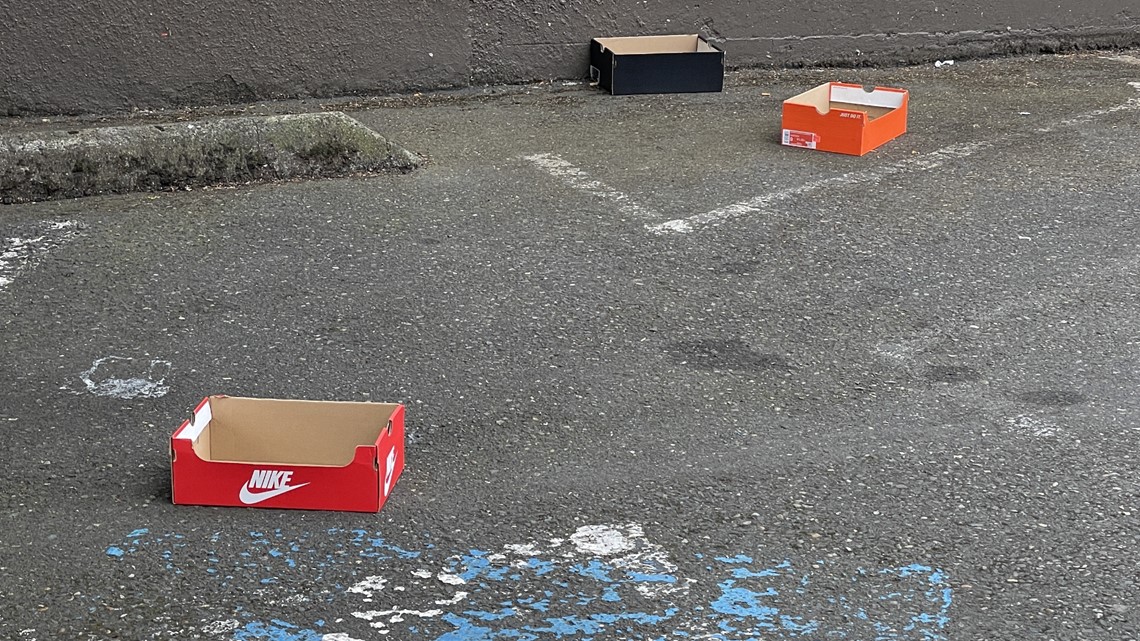
The resale market
So where is all this stolen merchandise going?
There’s a certain pattern to customers coming and going from the Target store at Mall 205. They park their car, walk in, purchase what they need and come back out. The whole routine seems to take less than a half-hour — at least, for most customers. And that what makes one guy stand out. He goes in and comes right back out.
After his second trip inside the store, I saw the guy hustling out with a box. It’s about the size of a small appliance. It must be heavy because he’s jostling from side-to-side while speed walking through the parking lot.
Security followed him outside the Target. They watched but didn’t pursue him. He loaded the box into a car waiting in the parking lot, then ran off.
The suspected thief met up with the car again and another man at a nearby gas station. They took the box out of the car and begin walking along Southeast Stark.
We followed the pair, still carrying this huge box into a retail parking lot. A man came out of a store, had some type of interaction, then loaded the box into a car. From there, who knows where the unopened box will end up.
Here’s how the experts say the cycle works:
First, someone steals merchandise. In the loss prevention world, this person is called a booster. They might steal relatively small amounts, work alone and operate locally. The booster sells the stolen goods to a middleman or fence — often, in exchange for drugs or money. It’s not uncommon for drug addicts to steal just enough to get by for the day.
The stolen goods are then listed and sold at deep discount on online platforms like OfferUp, eBay, Craigslist and Facebook. Sometimes they’re even sold at second-hand stores or flea markets.
“One thing that we’re seeing a huge increase in is what we call ‘brick and mortar fencing operations,'” explained Girard. “They are businesses set up to buy stolen merchandise and to resell it for large profits.”
In July 2022, Portland Police executed a search warrant on a motel room located roughly four blocks away from the Target at Mall 205.
“Large numbers of people who are not associated with the hotel as guests or employees would frequently come to the room with what appear to be unopened retail products,” Portland Police officer Ken Le wrote in a search warrant affidavit. Investigators say those unopened items, including Lego sets, would then be traded for counterfeit oxycodone M30 pills, known on the street as “blues.” Court documents show police recovered stolen items and toys during the raid on the motel room.
New response strategies
So, what’s the solution? Theft has always been an issue for retailers, but in recent years it has become more visible and brazen.
In September, Oregon created a statewide Retail Crime Task Force to improve collaboration and communication among police, local prosecutors and retailers.
“Organized retail crime has, unfortunately, hit Oregon big time! This is not your petty shoplifting, but sophisticated criminal rings that steal large amounts of merchandise, often store it in giant warehouses, and resell it online,” said Oregon Attorney General Ellen Rosenblum in a joint press release announcing the formation of Oregon’s task force.
Washington Attorney General Bob Ferguson created a similar task force in June.
Retail theft cases can be especially time consuming for police and prosecutors because individual crimes often involve relatively small dollar losses — resulting in misdemeanor charges. To hold repeat thieves accountable, investigators must link multiple crimes to a defendant, which sometimes involve multiple stores in different jurisdictions.
Retailers argue they need more help from police to help make shoplifting a priority, online retailers need to crackdown on the resale of stolen goods and prosecutors need to act with greater urgency.
“In Portland a lot of those individuals are not being arrested or prosecuted,” said Girard. “The bad guys know that.”

